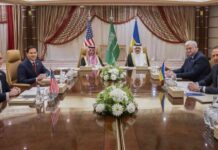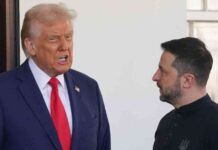Since the crypto markets are very sensitive to respond to regulatory and political developments, there is no question that the opinion of the leader of the world – and what do you think about crypto are extremely important when it comes to the direction that crypto-markets in the future will take. Many leaders were ready, the last couple of months to sit back and crypto-just organic to be and to be – more or less. However, there are signs that the time is for an official Act; a point of the Bitcoin and co. either of the state’s „Busts“ are crushed or wealthy support wool benefit.
Nevertheless, a single consistent attitude towards crypto-among the world’s leaders to locate, is almost impossible. Many leaders have different opinions to Bitcoin, Ethereum and other platforms or have not spoken yet at all open to the public. But under all the noise of a knowledge to available seems clear, namely, that many enthusiast are about the Blockchain technologies in its abstract Form, and less enthusiastic with regard to currencies, the currently existing Crypto.
to support could potentially have unpleasant implications for crypto, if such positions can lead to acute measures to be taken against decentralized platforms, instead of centralized, government-based Alternatives. If the decentralised and community driven crypto-currencies, however, to be so powerful, as its supporters claim, it could, what the world leaders say about crypto, in the long run, no real impact.
Donald Trump: „keep an eye“ on Bitcoin.
If you should name a world leader who loves it when it is spoken, then it is Donald Trump. It seems, however, that Donald Trump is so keen to talk about crypto, although it is possible that his General attitude to Bitcoin derive by looking at what the people in his environment say about crypto-currencies. And even if the words out of his environment are carefully selected, and – for the most part – qualified contributions were, it seems that Trump is currently the crypto-most sympathetic leaders of the Western world.
One of the recent Statements of one of the 45. President close Person came from Gary Cohn, which from January 2017 to April 2018 as 11. Director of the economic Committee, and previously as President at Goldman Sachs, had worked. He confirmed his Belief that one day there is a „global crypto-currency“. Bad news for Bitcoin Maximalists are not, however, that Cohn believes that this global Token will be Bitcoin. Instead, he is convinced that the Token, which is the rise and the future will dominate, cost „Mining cost or electricity, or something like that“ will be based.
Cohn is, in other words, a member of the „Blockchain not Bitcoin“-Clubs and although he has not worked for the Trump Administration as a senior economic Advisor, it seems as if other figures within trump’s inner circle and Trump are also members. In September, Margie grace, the senior information Director for the U.S. revealed-American offices for budget, Finance and Management, that the government explores use cases for Distributed Ledger technologies, while other representatives of the White house drive the adoption of data standards, which appear to be important for the sustainable Blockchain-adaptation.
This enthusiasm for Blockchain had a similar attitude towards crypto-currencies in the hope. This hope was, however, at the 30. November at a press conference largely nullified. On the question of whether „the President of all – especially Bitcoin – have observed,“ replied the press Secretary of the White house, Sarah Sanders:
„I know that this is something that [Trump] has in mind.“
Tellingly, has received this attention, mainly by Homeland Security Advisor Tom Bossert, pointed out that Bitcoin was more of a theme of the Trump government as the excitement.
While a statement from the state attorney General Jeff Sessions, in October, pointed out pointed out that the White house those crypto – currencies that currently exist, considered more as a Problem rather than the solution, interpret the recent statements of another former brain in trump’s circles – Steve Bannon-the fact that the President himself maintains a very friendly relationship to Bitcoin. In March, Bannon crypto praised currencies as a way for companies and governments, „of the Central banks to get away, devalue their currency, and slave wages“. Also, crypto not to allow currencies according to Bannon individuals the Power over their personal data by Tech companies to recapture to count as business category just the supporters of Trump.
He explained his comment further in June and described crypto-currencies as „revolutionary“. While it may be too far-fetched to assume that Trump, with his chief strategist, whom he had fired in August, right in this topic agree, it seems possible that a President, of the tax cuts has introduced, and for a smaller government, a technology can like, which brings back the control of the Central authorities. However, even if Trump is fond of private for Bitcoin, it is difficult to give a Translation of this attitude in the new government to identify policy – at least in the short term, and especially if you take into account the growing trends of the SEC and the CFTC, crypto-currencies, to limit.
EU: Blockchain via Bitcoin, despite the fan base
The governments of the United Kingdom, France, Germany, the Netherlands and Italy have all expressed intentions, crypto-currencies to be incorporated into their law books, where a common theme-laundering concerns in terms of safety and money in the Krypo-trade.
In December, the government in the UK, unveiled plans for a new law that the anonymous trading and trade without verification of the identity of crypto-exchanges declared illegal. The Minister of Finance Stephen Barclay said:
„We are at work, concerns about the use of crypto-currencies to resolve by negotiations will be conducted in virtual currency exchange platforms and some Wallet-integrate providers into the regulatory anti-money laundering and the financing of terrorism.“
Also, the French Finance Minister, Bruno Le Maire announced in January that France and Germany, auf would initiate the G20 summit in March, a joint push for the introduction of a uniform cryptocurrency regulation. Such co-ordinated actions by the two sides illustrate the consent to the cryptographic control at the highest level (i.e. at the level of the German Chancellor Angela Merkel and the French President, Emmanuel Macron). Having said that, it must be noted that the leaders of the EU and the G20 at the summit in March in Argentina, are not yet come to a consensus in the area of crypto. In spite of the 20 present Minister of Finance, who feared that crypto could support money laundering, avoiding taxes, or even to the financing of terrorist activities to be used were to little convinced that crypto-currencies pose a threat to financial stability, to make a decision. In this respect, all of the formulation of motivations or regulatory proposals were postponed to the next G20 summit in July.
It is unlikely that these recommendations will be particularly friendly, but it is worth noting that the European environment was not always hostile to Bitcoin, and the like. In July 2015, the then-Prime Minister David Cameron chose the London-based digital investment firm Blockchain, the British trade delegation to join to South-East Asia that suggested currencies to a positive attitude of the British government – and indeed the government as a whole and not only from individuals – compared to Crypto. His former number 2, Chancellor of the exchequer, George Osborne, had also announced that in March of the same year, 10 million pounds for the exploration of digital currencies would be available.
Chancellor Osborne as he made a withdrawal from a #bitcoin ATM pic.twitter.com/ZOERPCdmHm
— Innovate Finance (@InnFin) 6 makes. August 2014
Interestingly, the former Chancellor Osborne was such a Bitcoin Fan, that he settled in August 2014 at a Bitcoin withdrawal to photograph, and it can be assumed that also other persons in key positions are the personal followers of crypto. Emmanuel Macron was photographed in March 2016 with a Ledger Blue wallet, as he was as Finance Minister under François Hollande. He also suggested in the same month, legislation that the Blockchain would have used technology to bonds in the French bond market in a kind of crypto-assets.
French Minister of economy @Emmanuel macron with Ledger Blue, the Blockchain security device of the next Generation pic.twitter.com/puSCNxGYLp
Ledger (@LedgerHQ) 24. March 2016
This evidence of support for Bitcoin, however, are incurred prior to the great speculative Boom of the crypto-currencies last year, which led ultimately to the Finance Ministers of Spain warned to the Netherlands from the risks of the crypto-trade. Since then, the British Prime Minister, Theresa May, and Emmanuel Macron, and their like-minded people about crypto currencies are spoken of only in the context of regulation or „controls“. At the world economic forum in January, Macron, in a speech:
said, „I am in favour of the IMF should be given the mandate to shape the policy of the entire global financial system in which whole areas of regulatory escape. Such as Bitcoin, crypto-currencies and shadow banks.“
There are, however, some notable exceptions in the rigorous EU-attitude. In February 2017, Malta’s Prime Minister Joseph Muscat announced in a speech in Brussels that Europe should become „the Bitcoin-continents“.
„the rise of The crypto currencies can’t be stopped. Some financial institutions accept meticulously the fact that the System is behind such transactions much more efficient and more transparent than in the classical model.“
Since then, Malta has become, in spite of the increasing attitude of the EU, only crypto-friendly, and the two crypto-exchanges Binance and OKEx was able to welcome in June and April on the island floor. Malta is not the only, minor, crypto-friendly EU Nation at the Moment. Also, Lithuania has made steps in the direction of a positive framework of work and friendly regulations for the crypto industry. Likewise, the neighboring nation of Estonia, even if their plans for a national crypto-currency have been put on ice after the European the idea criticized the Central Bank violently.
East Asia: the Busts in the middle of a crypto-Revolution
If you move away from the Western world, met an even more restrictive attitude towards crypto-trading and crypto – currencies in General-notably in China in September 2017, exile, the Chinese government could only ICOs, but to ban crypto-to operate stock exchanges in the Asian country – a ban that was supplemented in February by the prohibition of foreign exchange transactions. The latest steps took place in spite of the re-election of President Xi Jinping in March, which is reportedly „one of the biggest proponents of free trade is in China for a Long time“.
Although Xi is not enough, apparently, as free trade advocates, to decentralized currencies in China, circulate, he is still a big Fan of the Blockchain technology. In may, he praised the Blockchain as part of a „technological Revolution“ that will revolutionize the world.
„The new Generation of information technology, represented by artificial intelligence, quantum information, mobile communication, the Internet of things and the Blockchain is accelerating breakthroughs in its capabilities.“
His support – together with the support of the Chinese government – for the Blockchain-technologies could explain why China in 2017, reported in a global comparison, the majority of registered Blockchain patents. Also in 2018, the prospects are good on the title again, after in April, more than 1.37 billion euros (1.6 billion U.S. dollars) additional state funding for Blockchain projects were provided. However, South Korea is the country with a similar penchant for Blockchain via Bitcoin close on the remote. In February, Finance Minister Kim Dong-yeon at a Meeting of the People’s Bank of China (BoC) pointed to the revolutionary potential of the Distributed Ledger:
„The Blockchain technology is a major technological breakthrough, the fourth industrielle Revolution. Therefore, the Ministry will proceed with the regulation of the crypto currency market carefully. For negative use cases of crypto, the Ministry will adopt currencies of strict regulations.“
South Korea has actually taken a tough stance when it comes to „negative use cases of crypto-currencies“, in spite of the widespread passion for the crypto-trade in the South Korean population. In November, the Prime Minister, Lee Nak-yeon, even so far as to say:
„There are the incidents of young Koreans, including students, to join in haste to earn quick money and also virtual currencies in illegal activities such as drug trafficking or Multi-used-Level Marketing fraud. […] This can lead to serious distortions, or of social pathological phenomena, if we are to tackle these problems. „
The strong rhetoric meets the regulatory steps taken by the South Korean government in the last months or for the upcoming threatened; these include the ICO-ban since September, and the prohibition of anonymous crypto-trade in January. The government of the country has, however, ceased to ban the trade altogether, and also President Moën Jae-in announced in January that it would be at least in the short term, not a complete ban.
This is confirmation of a „Non-ban“ indicates the non-linear development of the policy of the country. Most clearly shows this in the case of the Japanese Prime Minister, Shinzo Abe, in March 2014 – a month after Mt. Goxs infamous collapse – a document is not published, in which the Position of the government, Bitcoin as a currency will be listed. He justified the decision that Japanese banks were prohibited the provision of Bitcoin accounts, as well as all brokerage activities for Bitcoin:
„Bitcoin is neither a Japanese nor a foreign currency and its trading is different from transactions that are defined in Japan’s banking law and the financial instruments and exchange law.“
As the resulting crypto-industry of the Mt. Gox incident, recover and Japan was the second biggest crypto market in the world, it seems Abe’s negative attitude and the mitigate of the government – slow. In may of 2016, crypto-currencies were finally recognized as money, a step, which allows local banks to manage crypto and crypto-exchanges, within the regulatory framework of your business. Since then, it has to recognize the pioneering approach of the Nation, crypto-currencies, officially, to a certain extent, the regulatory approach and focus of most of the Western Nations adapted, although the regulation in Japan is focused more on the supportive, nurturing end of the spectrum.
Putin: Is he or is he not?
Back in the direction of Europe, President of Russia, Vladimir Putin has a stance against crypto, which is more or less as ambiguous as that of Donald Trump. For Putin, this ambiguity does not, however, comes from the unwillingness to talk about crypto-currencies and Blockchain – on the contrary; already in July 2017 he made at a G20 summit, his first comment to crypto-technologies:
„The Transition of the world economy in a new industrial order is supported by the development of digital technology. We believe that the G20 could play a leading role in shaping international arrangements in this area.“
While such a statement on the request could indicate to regulate crypto-currencies in a way that increases their potential for the creation of „a new industrial order“, other statements by Putin and the Russian government rather Grim suspect. Deputy Prime Minister Igor Shuvalov explained in August 2017, the government plans to introduce a state controlled crypto-currency with the name „CryptoRuble“, which is considered to be the only legally tradable digital currency in the country. „I support that the CryptoRuble is launched,“ he told a Russian news network. „We can’t hold crypto-currencies no longer under lock and key – the phenomenon will continue […] however, It should not go on a way forward, our economy hurts, but it strengthens. „
In the Wake of the published reports that Russia will introduce a new regulatory framework for Bitcoin and other crypto-currencies would legalize. In September, the Russian Finance Minister Anton Siluanov told the Moscow financial forum: „The state actually understands that crypto-currencies are real. There is no point to ban them, but there is a need to regulate them.“ So encouraging as it might have been, Putin this statement is contradicted again in October, by prohibiting currencies calling for Bitcoin and other Crypto. This prohibition should be according to the President necessary, since crypto currencies are dangerous „provide opportunities to launder money derived from criminal activities, tax evasion, and even terrorism financing, as well as to disseminate fraudulent schemes.“
His words were confirmed in the same month, when he officially confirmed the plans for the according to claimed CryptoRuble. However, the government was not then at a Meeting in December, again in agreement on whether these plans will ever be realized. Alexey Moiseev (Deputy Finance Minister) and Olga Skorobogatova (Deputy Governor of the Russian Central Bank) have claimed both that a state controlled crypto currency would be unnecessary . Crypto-currencies were back from the game – and then again not more, than Putin in March announced that the crypto-regulation, which legalized the trading with crypto, from 1. July 2018, to enter into force.
in this respect, currencies, Putin’s opinion about Crypto and their (legal) Status in Russia, finally made it clear, is it? Wrong: In June, he replied to a series of cryptographic questions, and although he included the possibility of apparently negative, that the country will welcome a CryptoRuble, he gave hardly any Alternatives in terms of the environment, which plans to design the government for crypto-currencies. He said this during a real-time question-And-answer Session:
„The relationship of the Central Bank of the Russian Federation to the crypto-currency is that the crypto-currency as a payment method and still considered as a store of value. The Crypto-Currency it is backed by nothing. You should treat it cautiously and reluctantly.“
Although Putin has supposedly spoken favourably about Blockchain technologies, it remains to be seen what kind of support he and his government hold in the future for crypto-currencies is ready.
Latin America: Restricted and state-guarded Cryptocurrencies
A similarly mixed picture emerges for Latin America, where the use of crypto-currencies very wide, but the government was not always willing to provide a legal framework for the further adaptation. This was mainly in Venezuela is clear: Because of the inflation crisis, the attack on the national currency (the Bolivar), turned to the people in the year 2017 mass-Bitcoin as an alternative means of payment, regardless of the fact that the government imprisoned Miner for crypto-currency.
however, This changed quickly in December, as the government announced, under Nicolas Madura, that you will spend a state-run, Oil-bound crypto-currency: the Petro. According to Maduro, the Petro-Venezuela „to act in matters of monetary sovereignty, financial transactions, and to overcome the financial blockade“. With this decision, the attitude of his government was loosened, in General, Cryptocurrencies and the mining of crypto was legalized in January. While Maduro himself made the turn no comment on this Policy, said to be „crypto-currency-Superintendent“ Carlos Vargas, of the following:
„It is an activity that is now completely legal. […] We have met with the Supreme court, so that people that took place in the past few years, victims of seizures of goods and arrests, the charges are dismissed.“
Unfortunately, this change is not reflected in goal-directed actions, which would promote the use of crypto-currencies forward, apart from the Launch of a free course that focuses on the Trade and mines of the said currencies. Maduro’s government has, meanwhile, almost exclusively in order to apply the Petro. In January, he urged the Bolivian Alliance for the Americas (ALBA), the Land for the use of the national crypto-currency connect:
„I lay on the table, dear brothers-the governments of the ALBA, the proposal, the crypto-currency Petro brave to accept, so that we can it as a joint project of the Integration in the 21st century. Century.“
Interestingly, the consequences of the other, more neo-liberal countries in Central and South America, the example of the USA and the EU, if there are regulations about crypto. In Brazil, various Blockchain have been created since the 2016 pilot projects of banks, companies and the government. However, the influential figures of the country rather critical and dismissive with regard to Bitcoin and co. Express. In October, the President of the Central Bank of Brazil Ilan Goldfajn made a comparison between Bitcoin and a pyramid scheme:
„The Bitcoin is a financial asset without Ballast, the people buy because they believe that his value will rise. This is a typical bubble or pyramid[nschema].“
While Rodrigo Maia, the President of the chamber of deputies, given that crypto-currencies could help in reducing tax evasion, have suggested that neither he nor President Michel Temer proposals for effective policies in the area. In the Empty silence of other Brazilian politicians, such as Expedito net – saw the opportunity for a blanket ban on Bitcoin.
In Mexico, was adopted under a regulation that restricts effectively the Commerce with crypto-currencies, and state supervision over their use introduces. In Argentina is – and was – the approach to digital currencies, however, always quite generous, possibly because of President Mauricio Macri seems to be private to Bitcoin interested in, at Least, considering his organisational role in the first Bitcoin Forum in the year 2015. In addition, he has published, among other things, a Facebook Post that refers to „interesting“ discussions about Bitcoin with the entrepreneur Richard Branson. And even though he has known since little to Bitcoin, implies the willingness of the Argentinian banks, for example, cross-border Bitcoin payments to offer a crypto-friendly environment.
interest in crypto to the power extraction
crypto is at a crossroads. After almost a fantastic Christmas time, in the Bitcoin in a single month to 154 per cent, exploded (in the four weeks prior to the 17th century. December), to fight crypto-currencies since then, to a safe Plateau. Regulatory setbacks, damaging Hacks, and criminal investigations have since the beginning of the year, one or the other currency sharply, the total market capitalisation, including all the coins currently at about 35 percent of their January highs of 712 billion euros (830 billion US dollars).
These turbulences are the reason that the leaders of the world are so important right now for the crypto-sphere; their views and the imposed regulatory policies will have a strong influence on how digital currencies will develop in the coming months and years. From the strong differences of opinion between the heads of state and government is a fundamental principle after all, The national governments want to ensure that decentralized crypto currencies its sovereignty over the ruled Nations to undermine, at the same time but you want to use crypto more to increase economic efficiency and to strengthen their respective positions.
This is evident in the zeal of EU leaders such as Emmanuel Macron and Theresa May in a bid to curb anonymous trading with crypto-currencies, much of the responsibility for the flow of money to maintain. These Fears and desires are also leaders like Nicolas Maduro and, possibly, Vladimir Putin, want to officially launch controlled crypto-currencies, in order to evade international sanctions and to support their abmühende economies. It is also seen in the enthusiasm with which the majority of managers Blockchain-technology, the „trust immutability“ of the technology to pick out from and these efficiency-strengthening in various sectors of the economy and Institution-level.
Nevertheless, although many of the government heads of only a interest, to take advantage of the Features of Blockchain-Tech, to strengthen their own Position, suggests their widespread private fascination for crypto-back currencies that we may receive promotional regulations. Between Emmanuel Macron, which has its own Ledger-Blue-Wallet, and Mauricio Macris organization of the Bitcoin conferences in Buenos Aires, there is little doubt that crypto-currencies and their promise for decentralized financial systems have caught the fancy of many a President or Prime Minister. However, it seems – at least at the Moment – so look, as if the leaders of our world are more likely to want crypto to their own interests and not the other way around.














